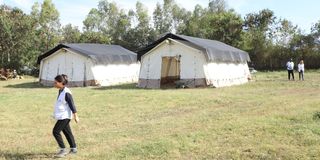Surveillance in top gear to contain cholera outbreak in Nyanza

Two temporary tents put up by Medecins Sans Frontieres (Doctors without borders) to be used by people showing signs of being infected with cholera at Homa Bay County Referral Hospital.
Health teams in Nyanza region have stepped up surveillance to contain an outbreak of cholera reported in Homa Bay County.
In Kisumu County, residents have reported that the water they were drawing from their taps had a bad smell and could be contaminated.
Five cases of cholera had been confirmed in Homa Bay by Monday, while 10 patients had presented symptoms of the infection had been put on treatment and were being monitored closely.
The County Health Chief officer Mr Kevin Osuro said they were considering suspending food hawking and closing down all markets to avert the spread of the disease.
The first case of the disease was reported at Marindi Sub-County Hospital on Thursday last week.
On Monday evening, five members of the same family were treated and discharged after presenting symptoms of the disease.
Medics have traced the origin of the infection to Achungo village in Rodi Kopany, Homa Bay Sub County.
Samples were being collected from patients for testing to confirm whether they had been infected.
“We have cases of people eating food sold to them without washing their hands and this could lead to a spontaneous rise in infections if we don’t stop the traders from hawking foodstuffs on the streets,” said Dr Osuri.
The health teams have taken their campaigns to rural communities where open defecation is common, thus contributing to the spread of the disease.
Safety of water
Residents of Milimani, Nyalenda, Dunga and Nyamasaria in Kisumu City have raised concerns about the safety and quality of the water from their taps.
Ms Rose Aoko, a mother of four rushed two of her children to Kowino Health Centre in Nyalenda slum after they started vomiting and diarrhoearing.
Residents of Nyalenda depend on the Dunga Water Treatment Works for their water supply and have asked the Kisumu Water and Sanitation Company (Kiwasco) to urgently investigate the cause of the foul smell from the water.
A notice from the water firm said the odour and colouration of the water could be linked to environmental factors.
Kiwasco managing director Thomas Odongo said the water company gets its raw water from Lake Victoria which is treated at the Dunga plant.
“We have not been spared from the effects of climate change, ranging from the rising lake water levels to the increased lake temperatures,” said Mr Odongo.
Homa Bay County Public Health officer John Kabaka said families living along the beaches of Lake Victoria had a tendency of relieving themselves in the water.
He attributed the problem of open defecation to weak soil structure in the county that makes it difficult for families to construct pit latrines for use in their homes.
“We have come up with a new technology which we use to build pit latrines, There are trained artisans to build them," said Mr Kabaka.
Homa Bay County Teaching and Referral Hospital Chief Executive Officer Peter Ogolla said doctors were attending to patients and collecting samples for testing.
He said results for the samples will be ready after 48 hours.
As a precautionary measure to minimise further infection, the hospital has set up temporary isolation wards at a field behind the general wards.
The two temporary tents put up by Medecins Sans Frontieres (Doctors without borders) will be used by people showing signs of being infected with cholera.
"One tent is for male parents and the other for females. There will be restricted entry and exit within the area," Dr Ogolla said.
The hospital announced that it has an adequate amount of fluids and oral rehydration salts to help patients who lose water from the bodies.
Dr Ogolla added that the hospital has well stocked antibiotics and other drugs which will be given to patients in isolation.






